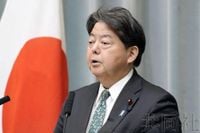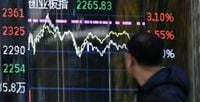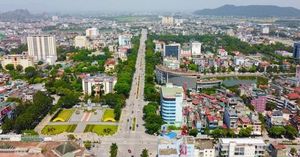On April 7, 2025, a wave of panic swept through global financial markets, triggered by a series of escalating trade tensions between the United States and China. The fallout from these tensions was particularly evident in the stock markets of Japan and South Korea, which opened sharply lower, and in the Chinese A-share market, which experienced a significant downturn.
During a press conference, Japanese Chief Cabinet Secretary Yoshimasa Hayashi addressed the situation, acknowledging the impact of U.S. tariffs on Chinese goods that had led to a dramatic decline in stock prices. "Relevant government departments will continue to pay close attention to domestic and international economic and financial market trends and carry out economic and fiscal work without any mistakes, based on cooperation," Hayashi stated. He also emphasized Japan's ongoing efforts to persuade the U.S. to reconsider its trade policies, stating, "I will continue to strongly demand that the United States adjust its approach." Furthermore, he mentioned that Prime Minister Fumio Kishida is planning a phone call with U.S. President Donald Trump to discuss these pressing issues.
The global stock market turmoil was dubbed "Black Monday" as it unfolded. The ChiNext Index in China fell more than 9% at one point, with major indexes across the A-share market showing significant declines. By midday, the Shanghai Composite Index had dropped 6.27%, while the Shenzhen Component Index fell 8.07%. Nearly 3,000 individual stocks plummeted by more than 9%, reflecting widespread investor panic and a lack of confidence in the market.
As of the time of writing, the Shanghai Composite Index was down 211 points, closing at 3130 points, while the Shenzhen Component Index ended the half-day down 830 points at 9535 points. The CSI 300 Index also reported a decline of 6.31%, closing at 3617 points. The overall trading volume was significant, with the Shanghai market recording a turnover of 487.186 billion yuan.
The downturn in the Chinese markets was fueled by recent tariff announcements from both the U.S. and China. On April 2, President Trump revealed that the U.S. would impose reciprocal tariffs on all trading partners, including a hefty 34% tariff on Chinese imports. This move raised the total tariff on Chinese goods to an unprecedented 54%, with an average weighted tariff reaching as high as 66%. The Chinese government responded swiftly, announcing on April 4 that it would impose a 34% tariff on all imports from the U.S., further escalating tensions.
Market analysts expressed deep concerns over the potential consequences of these tariff measures. Guoxin Securities noted that the additional tariffs on U.S. imports could have a positive effect on the agricultural sector in China, as it might boost domestic production and reduce reliance on foreign goods. However, the broader implications of these trade disputes raised fears of a prolonged economic slump, with some economists warning that failure to repair U.S.-China trade relations could lead to significant economic fallout.
In terms of sector performance during this market upheaval, agricultural and blood product stocks showed resilience, bucking the overall downward trend. Stocks like Meinong Biological surged by 20%, while Xinsai shares and Wanxiang Deg Nong reached their daily limit. Conversely, the CPO and Internet sectors faced severe losses, with companies like Tianrun Technology and Qingyun Technology dropping nearly 18%.
As the trading day progressed, the Hang Seng Technology Index in Hong Kong also fell sharply, dropping over 10%. Major players like BYD Electronics and Lenovo Group saw their stock prices decline by more than 15%, further illustrating the widespread impact of the trade tensions.
The sharp declines in the A-share market and the broader Asian markets were not isolated incidents; they reflected a growing global concern about the health of the economy amid rising protectionism and trade wars. Investors were left grappling with the uncertainty of the situation, with many fearing that the retaliatory tariffs could lead to further disruptions in the supply chain and foreign investment withdrawal.
As the day unfolded, the markets remained on edge, with traders closely monitoring developments regarding the planned phone call between Kishida and Trump. The outcome of this conversation could be pivotal in determining whether tensions ease or escalate further.
In summary, the events of April 7, 2025, marked a significant moment in the ongoing saga of U.S.-China trade relations and its impact on global markets. The sharp declines in stock prices serve as a stark reminder of the fragility of economic stability in the face of political decisions. As governments and markets react to these developments, the world watches closely, hoping for a resolution that can avert further economic turmoil.







